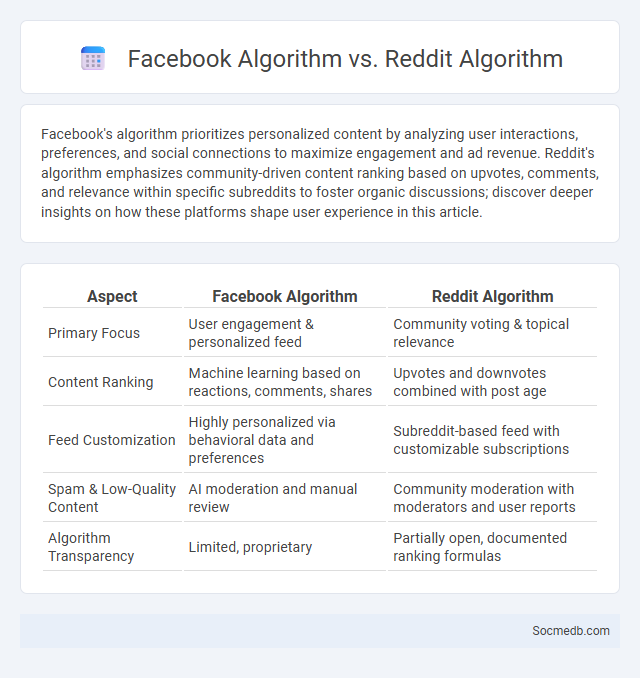
Photo illustration: Facebook Algorithm vs Reddit Algorithm
Facebook's algorithm prioritizes personalized content by analyzing user interactions, preferences, and social connections to maximize engagement and ad revenue. Reddit's algorithm emphasizes community-driven content ranking based on upvotes, comments, and relevance within specific subreddits to foster organic discussions; discover deeper insights on how these platforms shape user experience in this article.
Table of Comparison
| Aspect | Facebook Algorithm | Reddit Algorithm |
|---|---|---|
| Primary Focus | User engagement & personalized feed | Community voting & topical relevance |
| Content Ranking | Machine learning based on reactions, comments, shares | Upvotes and downvotes combined with post age |
| Feed Customization | Highly personalized via behavioral data and preferences | Subreddit-based feed with customizable subscriptions |
| Spam & Low-Quality Content | AI moderation and manual review | Community moderation with moderators and user reports |
| Algorithm Transparency | Limited, proprietary | Partially open, documented ranking formulas |
Introduction to Social Media Algorithms
Social media algorithms analyze user behavior and preferences to deliver personalized content, increasing engagement and time spent on platforms like Facebook, Instagram, and TikTok. These algorithms prioritize posts based on factors such as likes, shares, comments, and viewing history, optimizing content relevance for each user. Understanding algorithm mechanics is essential for marketers to enhance visibility and target audience interaction effectively.
Overview of the Facebook Algorithm
The Facebook algorithm prioritizes content based on user engagement, relevance, and timeliness to enhance personalized user experiences. It utilizes machine learning models to analyze interactions such as likes, comments, shares, and viewing duration, influencing the visibility of posts in News Feeds. Regular updates to the algorithm incorporate factors like content type, user preferences, and authenticity signals to combat misinformation and promote meaningful connections.
How Reddit’s Algorithm Works
Reddit's algorithm prioritizes content based on a combination of upvotes, downvotes, and the age of the post to determine its visibility on users' feeds. The platform uses a time decay function that ensures newer content gets a fair chance while highly voted posts can stay boosted longer. Understanding how Reddit's algorithm works can help You optimize your posts for maximum engagement and reach within target subreddits.
Key Differences Between Facebook and Reddit Algorithms
Facebook's algorithm prioritizes personalized content by analyzing your interactions, such as likes, comments, and shares, to curate a feed that maximizes engagement and keeps users connected with friends and pages. Reddit's algorithm emphasizes community-driven rankings, with posts gaining visibility based on upvotes and downvotes from users in specific subreddits, fostering niche discussions and diverse viewpoints. Understanding these differences helps you tailor content strategies for better reach and audience engagement on each platform.
Understanding the General Concept of Algorithms
Algorithms on social media platforms are complex sets of rules designed to personalize and prioritize content based on user behavior, engagement, and preferences. These systems analyze your interactions, such as likes, shares, and comments, to deliver relevant posts and advertisements that match your interests. Understanding these algorithms helps you optimize your content strategy to increase visibility and engagement across platforms like Facebook, Instagram, and Twitter.
Content Ranking Factors: Facebook vs Reddit
Facebook's content ranking algorithm prioritizes user engagement metrics such as likes, comments, and shares, alongside relevance and recency to ensure personalized content delivery. Reddit's ranking system emphasizes upvotes, downvotes, and comment activity within subreddits, while incorporating time decay to surface popular and trending posts. Facebook leans towards social graph-based recommendations, whereas Reddit focuses on community-driven interest filtering through subreddit categorization.
User Engagement and Algorithmic Impact
User engagement on social media platforms directly influences algorithmic visibility, as algorithms prioritize content that generates higher interaction rates such as likes, comments, and shares. Understanding these algorithmic mechanisms allows you to tailor your content strategy to maximize reach and foster meaningful connections with your audience. Consistent engagement boosts your profile's relevancy, leading to improved content ranking and sustained growth in follower interaction.
Pros and Cons of Each Algorithm
Social media algorithms prioritize user engagement by filtering content based on individual preferences, increasing personalized experiences and content relevance. However, these algorithms can create echo chambers, limiting exposure to diverse perspectives and potentially amplifying misinformation. While platforms like Facebook use relevance scores to boost engaging posts, Instagram emphasizes recent interactions, and TikTok relies on video completion rates, each approach presents trade-offs between personalized content discovery and the risk of content homogeneity.
Impact on Content Creators and Marketers
Social media platforms have revolutionized how content creators and marketers engage with audiences, offering unprecedented opportunities for brand visibility and user interaction. Your ability to leverage targeted advertising and real-time analytics enhances campaign effectiveness, driving higher conversion rates and fostering community loyalty. The evolving algorithms and diverse content formats demand continuous adaptation, ensuring your strategies remain relevant and impactful in a competitive digital landscape.
Future Trends in Social Media Algorithms
Future trends in social media algorithms emphasize enhanced personalization through AI-driven content curation, prioritizing user engagement and relevance. These algorithms increasingly leverage machine learning to detect evolving user preferences and behavior patterns, improving real-time content recommendations. Privacy-conscious models that balance data security with targeted advertising are becoming essential in algorithm design to foster trust and compliance with regulations.
 socmedb.com
socmedb.com